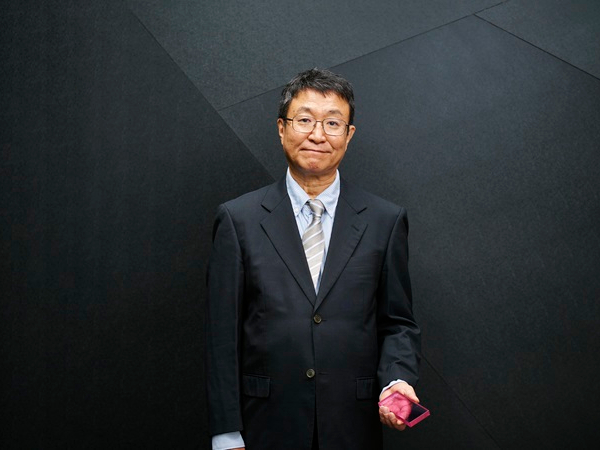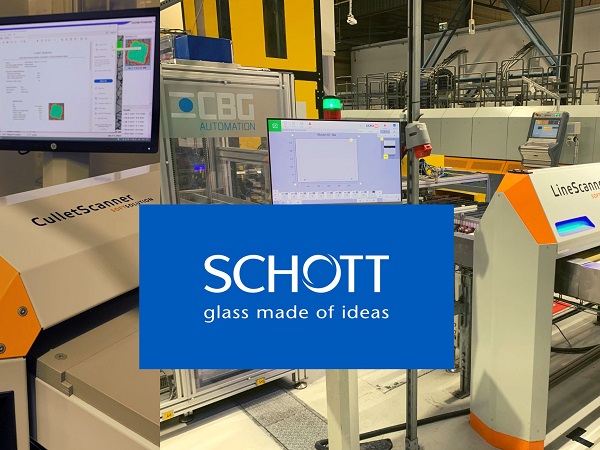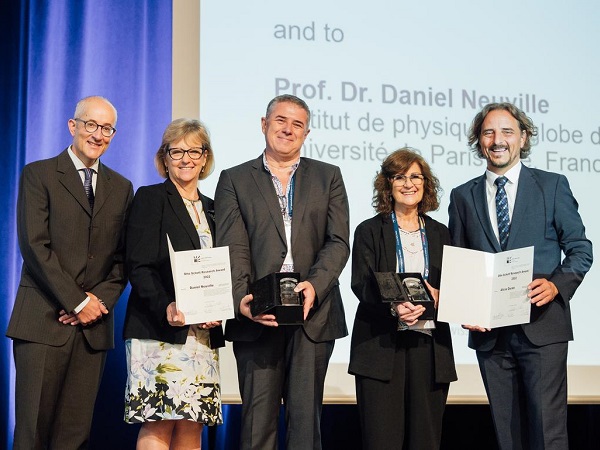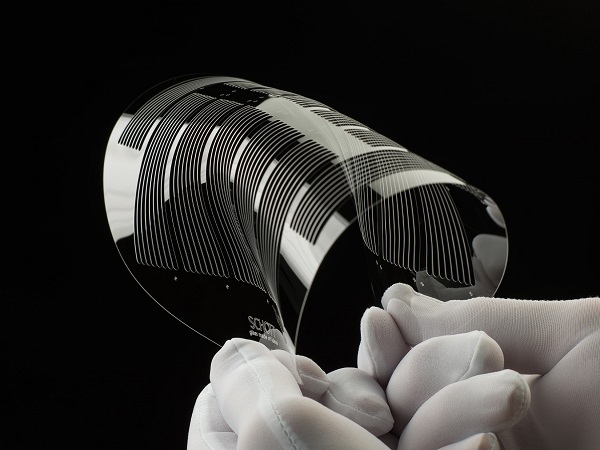Date: 28 May 2014
The Canadian experimental volcanologist has headed the Department of Mineralogy and Petrology at the Ludwig Maximilian University (LMU) in Munich since 2000 and is Director of the Department of Earth and Environmental Sciences. Dingwell received the award for his many years of research in the field of physical and chemical properties of volcanic glasses. “His work on glass formation under extreme conditions like those that occur during volcanic activity provide us with valuable insights for use in industrial glass melting,” noted Dr. Hans-Joachim Konz, Chairman of the Board of Trustees of the Ernst Abbe Fund and Member of the Board of Management of SCHOTT AG, during the award ceremony that was held at an international conference on glass technology in Aachen.
.jpg)
The Otto Schott Research Award 2014 went to the experimental volcanologist Professor Donald Bruce Dingwell (2nd from left) from the Ludwig-Maximilian-University (LMU) in Munich. The Canadian received the prize for his many years of research in the field of physical and chemical properties of volcanic glasses. The award was presented by Dr. Hans-Joachim Konz (2nd from right), member of the Board of Management of SCHOTT AG and Chairman of the Board of Trustees of the Ernst Abbe Fund, and took place as part of an international conference on glass technology in Aachen, Germany. On the right the member of the Board of Trustees and laudator Professor Carlo Pantano (Penn State University), on the left the member of the Board of Trustees Professor Reinhard Conradt (RWTH Aachen).
Professor Dingwell’s research centers on the role of melts and glasses in geologic processes. He succeeded in documenting the central role that the glass transition plays in explosive volcanism. This makes him a pioneer in the quantification of thermodynamic and transport properties of molten silicates of both simple and complex compositions. We owe the fact that experimental volcanology has reached this high level to Professor Dingwell and his team. Countless scientific publications document how thoroughly Dingwell and his colleagues have collected and analyzed this data. And the academic community benefits from this as well – Dingwell ranks among the world’s most frequently quoted authors on his discipline. In the meantime, not only volcanologists and geoscientists, but also glass engineers and developers use his wealth of data and the respective formulas to derive the properties of a glass from its composition and structure. In light of this, member of the Board of Trustees and laudator Professor Carlo Pantano praised the award winner for his achievements: “Professor Donald B. Dingwell is an outstanding researcher whose work on the thermomechanical properties of silicate glasses and melts has a major impact on the geosciences, glass science and glass technology. He has published more than 300 articles on the water solubility in melts, the effects of glass compositions on viscosity and thermal expansion, but also viscoelastic reactions with simple and complex glasses. These fundamental insights have advanced the understanding of melting and shaping of industrial glasses.”
Dingwell began his scientific career in the late 1970s by studying physics and chemistry. He earned his doctorate in Geology (Ph.D.) at the University of Alberta in Edmonton, Canada, in 1984 by writing a dissertation on the topic “Investigation of the role of fluorine in silicate melts: implication for igneous petrogenesis.” In 1992, he qualified to teach at the University of Bayreuth (Germany) on the topic “Relaxation and Rheology in Silicate Melts.” He was also a Visiting Professor at Stanford University and the California Institute of Technology. From 2011 to 2013, the geoscientist served as Secretary General of the ERC (European Research Council). In 2014, he was appointed to the Executive Committee of the Deep Carbon Observatory (DCO) and to the Board of Academia Europaea. In 2013, Donald Dingwell received the Order of Merit from the Federal Republic of Germany for, in addition to his other accomplishments, his “energetic and ongoing work” on behalf of the Geosciences at the University of Munich. At the same time, the renowned scientist cultivates an open and active dialogue between the public and science. The volcanic ash events that took place in April 2010 are an example. As a leading expert, Dingwell informed the public about these complex topics in an easily understandable manner via the media.
The Otto Schott Research Award is presented every two years by the Ernst Abbe Fund to recognize outstanding achievements in the area of fundamental research and technology development in the fields of glass and glass-ceramic sciences for the areas of application optics and electronics, renewable energies, health and lifestyle. The award that is also aimed at encouraging collaboration between science and industry was first presented in 1991. It recognizes individuals as well as small teams for their special achievements. The previous winners of the Otto Schott Research Award include not only German physicists and chemists, but also researchers from the United States, Russia, Japan, China and other European countries.
SCHOTT is an international technology group with 130 years of experience in the areas of specialty glasses and materials and advanced technologies. SCHOTT ranks number one in the world with many of its products. Its core markets are the household appliance, pharmaceutical, electronics, optics, and transportation industries. The company is strongly committed to contributing to its customers’ success and making SCHOTT an important part of people’s lives with high-quality products and intelligent solutions. SCHOTT is committed to managing its business in a sustainable manner and supporting its employees, society and the environment. The SCHOTT Group maintains close proximity to its customers with manufacturing and sales units in 35 countries. Its workforce of 15,400 employees generated worldwide sales of approximately 1.84 billion euros for the 2012/2013 fiscal year. SCHOTT AG, with its headquarters in Mainz (Germany) is owned by the Carl Zeiss Foundation.







Add new comment